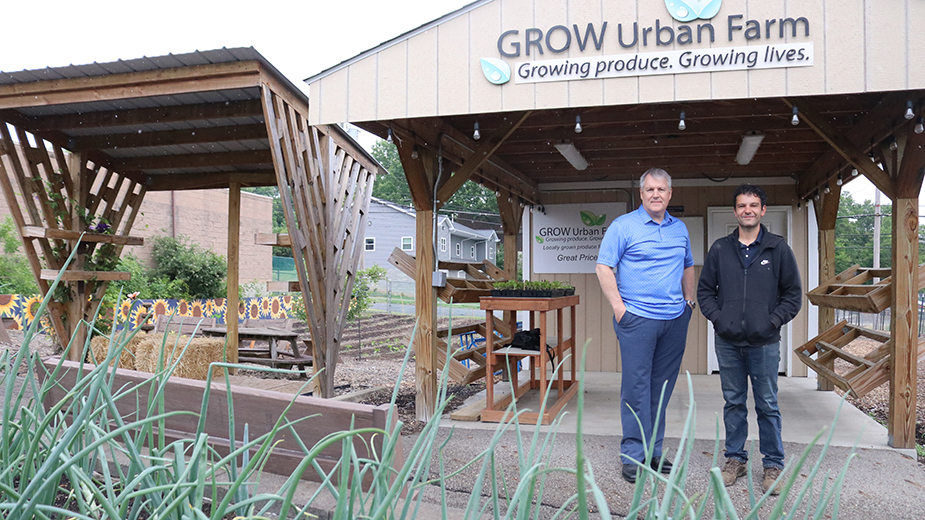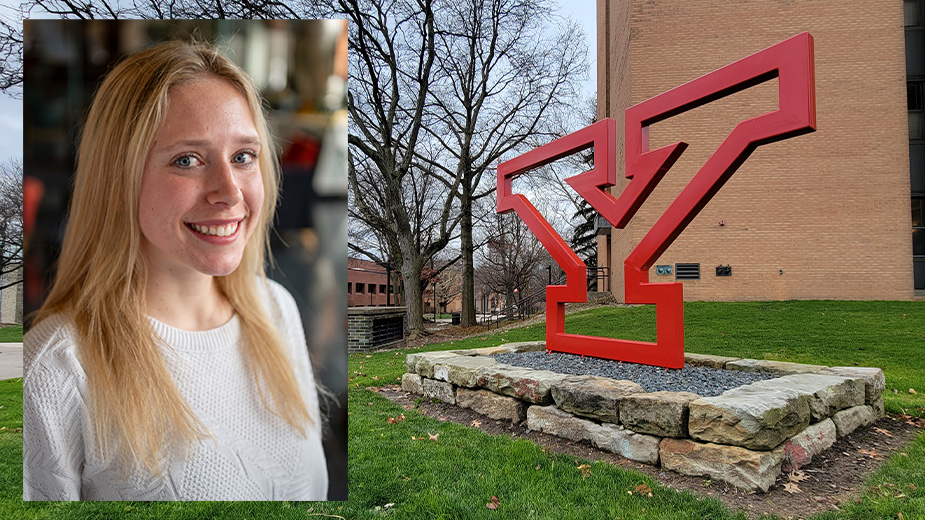GROW Urban Farm Helps Returning Citizens Flourish
YOUNGSTOWN, Ohio – Between recovery housing for returning citizens in Youngstown and a job training center for welding sits a green oasis – GROW Urban Farm.
GROW stands for Gaining Real Opportunities for Work – appropriate for a place started a decade ago by Flying High as a way to help returning citizens – those re-entering society after incarceration – rebuild their lives, stop negative cycles and join the workforce.
“They know that their lives are being used for something productive, not things that are destructive,” says Jeff Magada, executive director of Flying High. “It’s peaceful out here, like an urban oasis.”
What was once an asphalt parking lot behind the Ohio Valley Teen Challenge on Florencedale Avenue is now home to a greenhouse with rows of tomatoes, beans and peppers.
The farm is only three-quarters of an acre, so space has to be maximized.
“This is a tool,” says Magada. “The farm was made as a tool to work acclimate. So individuals can learn workforce skills while they’re giving back to the community. It’s just as much a tool for that as it is to grow food.”
Anthony Albert, resident farmer and educator at GROW, believes in growing organic food and is skilled in saving seeds to replant next year. He teaches those skills to the returning citizens who come to work in the garden, along with crop rotation, pest elimination by adding praying mantises instead of chemicals and protecting vulnerable crops from moth larvae with hoop houses.
“The thing I love about this is if you teach a person how to grow food, how to save their seeds, you are teaching them how to feed their family in hard times,” Albert says. “If they teach two friends how to do it, how do you calculate that? You can’t. You can be a tiny part of helping a generation get through hard times, just a tiny part.”
The USDA offers resources and financial assistance for starting or expanding an urban agriculture endeavor, including the cultivation, processing and distribution of agricultural products in urban and suburban areas. Examples include community gardens, rooftop farms, vertical production and hydroponic, aeroponic and aquaponic facilities.
How It Started
Magada became interested in urban farming more than 10 years ago. He attributes the urban farm’s location to Rev. Roy Barnett, who insisted Magada consider it even though much of the property was blacktopped. The raised plant beds now sitting on the lot came with the help of the Ohio State Extension office, which found the pavement keeps the soil warmer longer.
All the structures in the garden have been built by those in the program. They cleared the debris from the back of the property and built the beds, benches and garden decorations with the help of those learning welding in the lab next to the garden.
“They always contribute a little something creative and they work it into their curriculum,” Albert says. “It’s pretty cool.”
Those planting and tending to the garden gain work skills and the satisfaction of creating something that helps themselves and others. They also can start earning training stipends, keeping a portion for themselves, but putting some away into a purpose account from which they can save to get their driver’s license, pay off court fines or make an apartment security deposit. They are encouraged similarly to open a savings account.
Magada says one formerly incarcerated man managed to pay off more than $10,000 in court fines, purchase a new vehicle and buy a trailer with purpose money he earned on his way back into society. He slowly transitioned to full-time employment.
“It starts with a seed and that seed represents your decisions and so it’s symbolic of the growth we see in the people we serve,” says Magada. “Like any seed, it needs to be watched. It needs to be fertilized and cared for before it can produce to its potential.”
Partnering with Action, the produce and flowers grown in the garden are sold through the Mahoning Valley Mobile Market, which makes regular stops throughout the area, bringing basic groceries and fresh produce. Albert has plans to sell extra flats of plants so people can grow their own at home.
Magada says the market has been wildly successful in the communities where it travels.
“You don’t know sometimes when the community needs something until you get it out there,” says Magada, adding they are approaching 10,000 customers only a year after launching. “But now people are depending on that. They wait for that to come on a monthly basis. They are so appreciative of the vouchers that are being provided and after Year One, it has become more of a staple for people.”
Already this year, Albert says the garden has produced asparagus and strawberries. The raspberries are ripening and onion bulbs are expanding.
The farm will produce a wide variety of items this summer, including okra, wine-capped mushrooms, bok choy and miniature cantaloupes.
“Everybody understands food,” says Albert. “It’s ancient. I mean, that’s in our DNA to bond over food. That’s like the universal language.”
Copyright 2024 The Business Journal, Youngstown, Ohio.



